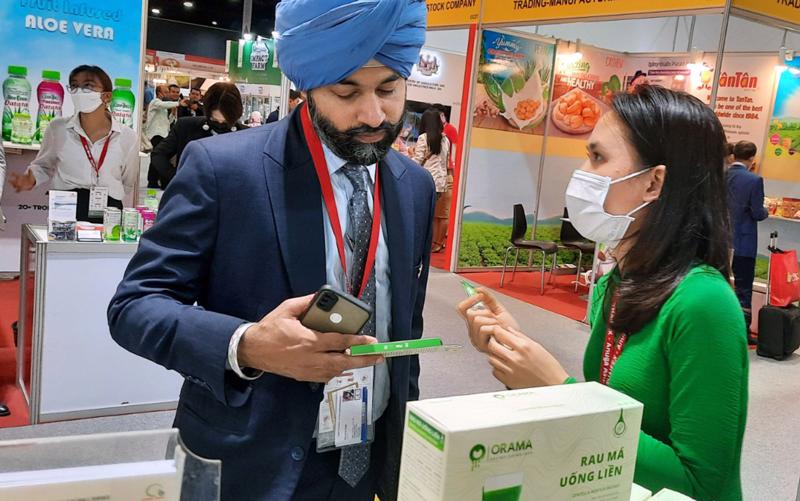The global Halal market is among the most promising markets in terms of scale, population growth, spending capacity, and diversity of sectors, with increasing growth prospects in the future.
According to the Institute for South Asian, West Asian and African Studies (ISAWAAS), in Arabic, "Halal" means "permissible" or "lawful" as defined by the Qur'an and Islamic Sharia law. Halal is not limited to alcohol-free and pork-free products or those slaughtered according to Islamic rites. The scope of Halal is broader, emphasizing the purity of products, which should be as close as possible to their natural state.
The Halal market presents promising business opportunities for Vietnamese enterprises, particularly in the fields of agriculture and processed foods. With a Muslim population of approximately 2 billion people, accounting for 25% of the global population, the demand for Halal products is rising rapidly. It is forecasted that the global Halal economy will reach about USD 10 trillion by 2028.
According to the 2024 Global Halal Food Market Report by Cognitive Market Research, the global Halal food market is valued at nearly USD 2,548.5 billion in 2024 and is expected to rise to USD 4,934.73 billion by 2031, with an annual growth rate of 9.9% between 2024 and 2031.
The demand for Halal food is not limited to Muslim countries but is expanding to other markets such as China, which has a large Muslim population estimated at 21–23 million people, expected to reach 30 million by 2030.
Vietnam, with its strengths as an agricultural country, has great potential to deeply integrate into the Halal food supply chain. Currently, Vietnam’s main Halal exports include agricultural products and raw materials. However, an increasing number of Vietnamese enterprises have obtained Halal certification, allowing access to the vast markets of the Organization of Islamic Cooperation (OIC) countries.
Vietnam’s potential for expanding Halal exports is further demonstrated by its position among the world’s top 20 food-exporting countries, one of the top 15 agricultural exporters globally, and a key link in global supply chains, having signed 17 Free Trade Agreements (FTAs), including many next-generation and inter-regional FTAs.
However, entering the Halal market also poses many challenges. To penetrate this market, Vietnamese products—from food and beverages to garments—must be produced under strict processes, meeting Halal criteria and standards and be certified accordingly. This includes avoiding harmful substances, pesticides, fertilizers, preservatives, waste, antibiotics, banned goods, and genetically modified organisms. Halal also emphasizes purity in behavior and conscience, requiring good moral values and ethical choices in daily life. Moreover, Halal is closely linked to organic agriculture, fair trade, product safety, ethical business practices, human behavior towards animals, and ecological economics.
Vietnamese enterprises have yet to establish a complete Halal ecosystem, while other markets such as Brazil, Singapore, and Indonesia already play significant roles in supply and market share thanks to their long-standing experience and advantages. To effectively tap into the Halal market, Vietnam needs to develop a comprehensive Halal ecosystem and build a national brand for Halal agricultural exports. This requires close coordination among government agencies, businesses, and Halal certification organizations to ensure product quality and standards.
According to Deputy Minister of Industry and Trade Nguyễn Sinh Nhật Tân, the USD 2 trillion global Halal market presents a significant opportunity for Vietnamese exports. With continued efforts and the current growth rate, Vietnam could achieve a high market share in the global Halal sector within the next five years.
Notably, the Government Office recently issued Official Letter No. 4169/VPCP-KTTH conveying Prime Minister Phạm Minh Chính’s directive on "Expanding exports to the Halal market." The Prime Minister requested the Ministry of Industry and Trade and the Ministry of Foreign Affairs to study the information in Report No. 388/2025/TTĐT dated May 8, 2025, from the Government Portal, to formulate a plan to promote Halal food exports.
Given these vast potentials and open opportunities, the Halal market is becoming an important direction for Vietnamese enterprises in their export expansion strategies. However, to fully capitalize on this advantage, close cooperation is required among the government, businesses, and certification bodies to build a well-structured Halal ecosystem that meets international standards.
Accordingly, Vietnam needs specific support policies, including prioritizing budget resources for production and certification, boosting trade promotion, and training dedicated Halal professionals. At the same time, there must be reputable intermediary organizations to assist enterprises in the certification process and in complying with the regulations of export markets.
